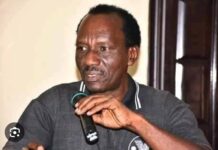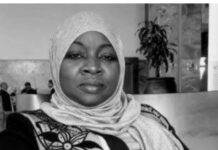 As President Mohammad Buhari took off yesterday for the United States on the special invitation of President Barack Obama, expectations are high both in Nigeria and the United States on the outcome of the visit. To attain success, President Buhari needs to define his priorities, marshal them out and ensure that he also understands and matches them with the needs of the United States. As the saying goes, good policy begins with the ability to recognize reality. It is for this goal that I venture to state what I think President Buhari needs to tell President Obama.
As President Mohammad Buhari took off yesterday for the United States on the special invitation of President Barack Obama, expectations are high both in Nigeria and the United States on the outcome of the visit. To attain success, President Buhari needs to define his priorities, marshal them out and ensure that he also understands and matches them with the needs of the United States. As the saying goes, good policy begins with the ability to recognize reality. It is for this goal that I venture to state what I think President Buhari needs to tell President Obama.
In my view, Nigeria’s problems are basically three in nature – insecurity, corruption and severe economic depression. And for the United States, its problems are also mainly three in nature –terrorism and insecurity especially in the Islamic World; global threat to its corporate economic interests; and apparent failure to fashion out how best to handle and resolve the problems. If the two leaders are able to identify these problems and see them as mutually reinforcing and their resolution as mutually beneficial, and resolve to work towards it, then the visit would meet the high expectations on both sides of the divide.
Making a comprehensive analysis of the issues involved will show that Nigeria needs the United States in solving its problems in as much as the United States needs Nigeria’s problems resolved as a critical element in the resolution of its problems. With the fall of communism on the global scene, the Western World under the leadership of the United States came into direct conflict with the Islamic World in what seems to be a clash of civilizations. The seemingly irreconcilable ideological positions of the two former allies have since put the world’s security on the edge. Also, under the effect of globalization, the United States strategic economic interests as a super power have come under severe threat globally. The war for wealth, a nastyfight for a share of prosperity, and the related struggle over political and cultural dominance of the world, have become the major conflicts the US is facing across the globe today. The era of America’s supremacy, in which it overshadowed the rest of the world with its economic and technological might, is fast coming to an end. A new topography of global power equation is taking shape as globalization is shifting world economic emphasis from the United States.
In Asia, which contains more than half of the world population, the US economic interests are increasingly being challenged not only by Japan and the US-propped ‘Asian Tigers’, but also more by the turncoat communist and socialist states of China and India. All over Asia US firms are today in a cut-throat competition with companies of these Asian countries. The result is that the productive core of the US is shrinking, while Asia’s is expanding; Asia’s new strength leads to the weakening of the US. As Asia booms America faces mass unemployment and growing national debt. In Europe, the situation is no better. The Marshall Plan of the post-World War II have long outlived its usefulness as most European companies have become arch rivals of American firms in the war for wealth. As more and more European firms offer the same standard of service, the need for America’s firms decreases all across Europe. With the formation of European Union and the Euro Zone, Europe not only expanded its economic base but has also fortified it. Ultimately, over the years, America’s firms are taking marginal spots in Europe’s economic life.
America thus needs to look beyond Asia and Europe for its economic expansion and preeminence. With the emerging crisis of confidence in relations between America and the Muslim World, especially in the aftermath of 9/11 terror attack, and the accompanying tension between them following the declared war on terrorism, the US has only one large region to look up to – Africa.With a population of over a billion people, Africa is undoubtedly a reservoir of a potential huge world market. Besides, not only Africa has the world’s most unexplored and unexploited natural resources, but the continent’s religious affiliations, be it Islamic, Christian or traditional, are not extreme in nature. All its religions rest on a solid foundation of African cultural traditions. Hence religious identity does not have the same meaning in African communities as it does in say Arabia, Asia Minor or Israel.
In Nigeria, there are probably more commonalities among ethnoreligious groups than differences. With the right economic and social environments, Nigeria can reclaim this African heritage without being overwhelmed by the forces of global religious extremism. The current Boko Haram terrorism and insurgency in Nigeria is in fact an exception rather than the norm. It is the result of economic hardship, constitutional freedom and lack of any form of dialogue with the Muslim communities in the country that sparked off the conflict. Indeed, severe poverty has direct relevance to the current insecurity situation. Since 1999, Nigerians are being promised and assured of good life by politicians seeking public offices. Under the generic parlance of “dividends of democracy”, they have been promised high standard of living – i.e. assured peace, security, education, healthcare, power, clean potable water, economic prosperity, political rights and freedom, transparency and honesty in leadership, etc. But how so disappointed Nigerians have become today!
While the ‘democratic constitution’ of the county has brought in liberty, rights and freedom to individuals and groups in the country, the promised and expected ‘high standard of living’ woefully failed to materialize. On the contrary, there resulted a large scale and wide spread poverty and hardship across the land, chiefly brought about by poor or failed public policies, high level of corruption and dishonesty by elected public officers, election and electoral malpractices by incumbents, a compromised and insincere judiciary, among many other vices in public service. Furthermore, in so short a time, there emerged in the country a glaring disparity in the earnings and living standards amongst the citizens never seen before in the history of economic and social mobility of a people anywhere in the world; such that today in Nigeria less than 2% of Nigerians (most of whom are the very politicians elected) own and control over 98% of the national wealth, while more than 98% of the citizens struggle daily to survive on less than 2% of the country’s resources. As these policies are seen being facilitated, driven and implemented by the political class over the years, naturally there is today no love lost between the masses and politicians. Here then lies the real source of terrorism in Nigeria.
As rightly maintained by Ted Gurr, a world renowned Criminologist, “when expectations go up and realities go down, men rebel”. For all the facts have shown that the Boko Haram insurgency is basically the result of failed expectations of ‘dividends of democracy’ under civil rule. Contrasting the personal and collective freedom and liberty of citizens ushered in through constitutional democracy with the failed promises and expectations of improved standard of living of citizens, one then sees clearly the seeds of crises being sown in the society. Add the polarization and great disparity of wealth amongst citizens, the overt and insensitive corruption by public servants, the increasing widespread of poverty and deprivation within the vast majority of the people, the extreme forms of election frauds by incumbent leaders, the compromised judiciary, etc., relations between the government and the governed invariably have to come under severe stress. Because the local civic cultures are unable to withstand the stresses and strains of these economic and political pressures, it naturally breeds disappointment, despair and instability. It then takes very little for civil resistance to go virulent. This is the proper explanation of the various insurgencies, including the BH insurgency, ravaging the country today. Hence it makes no sense to debate whether these insurgencies are political, socio-economic or religious. The answer is they are all of the above.
As President Buhari gets to meet with President Obama in the hope of resolving this problem, he must understand its fundamental underpinnings. The challenge is for the government to resolve its two most critical elements – i.e. the economic and the political elements. On the economic level, the President must get the support of the United States to build a strong base for the country. The United States must have to come forcefully in terms of funding, investments, transfer of technology, and other initiatives to help Nigeria out of its present economic doldrums, at the same time decentralizing economic opportunities and national resources in such a way as to bridge the wide gap between the rich and the poor amongst Nigerians. On the political side, President Buhari’s government must tackle corruption, build infrastructure, freely open the political space, entrench constitutionalism and rule of law, institute credible electoral processes and create level playing fields in politics to avoid causing system breakdown.
In return, on its part, Nigeria, being the most dominant in the African Continent, with the largest human and material resources, and the largest number of black Muslims in the world, should play a central role in the fight against terrorism, in global stability and the advancement of the US economic and strategic interests. Already a strong international player in peacekeeping operations, Oil and Liquefied Natural Gas deposits, Oil pricing within OPEC, leadership role in the OIC, AU, ECOWAS, etc. Nigeria is well positioned to partner with the US in stabilizing the global environment. Being the largest non-Arab Muslim country in Africa, Nigeria can play a key role in evolving constructive specific relations regarding America with the non-Arab Muslim countries that can serve as a counter-balance to the broad international relations between the West and the Islamic World. Such relations will aim to ultimately oscillate the centers of worldwide Muslim community between Southeast Asia and West Africa, where pluralism and tolerance is more established than in the Middle East, Arabia and Asia Minor. This is very crucial not only to opening US economic vistas and advancing its corporate interests but also restoring security and stability in the international community. With good support from the United States Nigeria can initiate and execute such defining role.
This is what Buhari needs to tell Obama.



